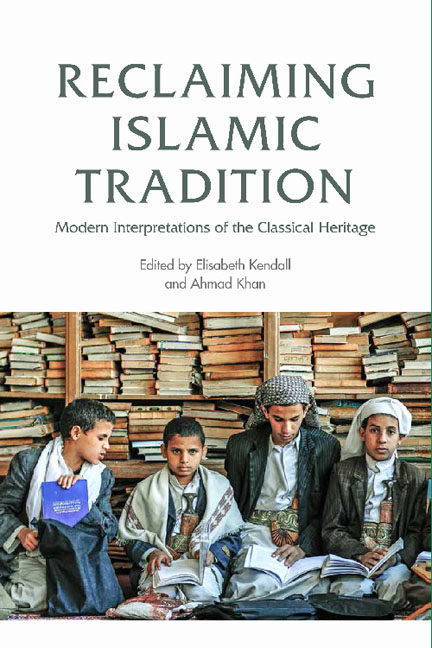Book contents
- Frontmatter
- Contents
- Acknowledgements
- About the Contributors
- Introduction
- 1 Modern Shiʿite Legal Theory and the Classical Tradition
- 2 Muḥammad Nāṣīr al-Dīn al-Albānī and Traditional Hadith Criticism
- 3 Islamic Tradition in an Age of Print: Editing, Printing and Publishing the Classical Heritage
- 4 Reaching into the Obscure Past: The Islamic Legal Heritage and Reform in the Modern Period
- 5 Reading Sūrat al-Anʿām with Muḥammad Rashīd Riḍā and Sayyid Quṣb
- 6 Contemporary Iranian Interpretations of the Qurʾan and Tradition on Women’s Testimony
- 7 Ibn Taymiyya Between Moderation and Radicalism
- 8 The Impact of a Sixteenth-Century Jihad Treatise on Colonial and Modern India
- 9 Jihadist Propaganda and its Exploitation of the Arab Poetic Tradition
- 10 Contemporary Salafi Literature on Paradise and Hell: The Case of ʿUmar Sulaymān al-Ashqar
- Index
9 - Jihadist Propaganda and its Exploitation of the Arab Poetic Tradition
Published online by Cambridge University Press: 11 November 2020
- Frontmatter
- Contents
- Acknowledgements
- About the Contributors
- Introduction
- 1 Modern Shiʿite Legal Theory and the Classical Tradition
- 2 Muḥammad Nāṣīr al-Dīn al-Albānī and Traditional Hadith Criticism
- 3 Islamic Tradition in an Age of Print: Editing, Printing and Publishing the Classical Heritage
- 4 Reaching into the Obscure Past: The Islamic Legal Heritage and Reform in the Modern Period
- 5 Reading Sūrat al-Anʿām with Muḥammad Rashīd Riḍā and Sayyid Quṣb
- 6 Contemporary Iranian Interpretations of the Qurʾan and Tradition on Women’s Testimony
- 7 Ibn Taymiyya Between Moderation and Radicalism
- 8 The Impact of a Sixteenth-Century Jihad Treatise on Colonial and Modern India
- 9 Jihadist Propaganda and its Exploitation of the Arab Poetic Tradition
- 10 Contemporary Salafi Literature on Paradise and Hell: The Case of ʿUmar Sulaymān al-Ashqar
- Index
Summary
Introduction
A leading scholar of Islamist militancy recently posed a blunt question: ‘Why is it that hunted terrorists spend time on poetry when they could be training?’ This is a powerfully pertinent question. The answer goes to the heart of the social dynamics, motivation and recruitment techniques of jihadist groups. I have written previously on the significance and functions of poetry in winning hearts and minds for the militant jihadist cause. This chapter departs from my previous research in that it focuses specifically on how and why contemporary jihadists use the Arab classical poetic tradition as a propaganda tool.
First, it is important to understand that poetry holds a revered position in Arab culture and that it enjoys widespread appeal in both popular and elite circles. Generally considered to be the oldest art form in the Arab world, poetry permeates all sectors of the social hierarchy and deals with a vast range of life's activities, from politics to pleasure, and from war to wisdom. Over the centuries it has been used widely not only to record history but also actively to shape it. In other words, more than simply reflecting the world we see, Arabic poetry has the capacity to influence how we view the world. Small wonder then that jihadist movements, both under the umbrella of what we now know as al-Qāʿida and of the so-called Islamic State, make liberal use of this vast and venerable resource. It is reasonably well known that leading jihadists penned their own poetry, including both the former and current global leaders of al-Qāʿida, Osama bin Laden (d. 2013) and Ayman al-Ẓawāhirī, as well as Abū Muṣʿab al-Zarqāwī (d. 2006), leader of al-Qāʿida in Iraq, the group that metamorphosed into Islamic State. What is less well explored is the way in which jihadists have drawn on the classical poetic heritage, even in poetry that has been deemed to be their own creation. This therefore is the focus of this chapter.
The incorporation of canonical texts from the classical poetic tradition into today's jihadist narratives mirrors the use of canonical religious texts. Both categories of text are ‘claimed’ and reinterpreted within contexts that buttress the ideals of modern militant jihad.
- Type
- Chapter
- Information
- Reclaiming Islamic TraditionModern Interpretations of the Classical Heritage, pp. 223 - 246Publisher: Edinburgh University PressPrint publication year: 2018



